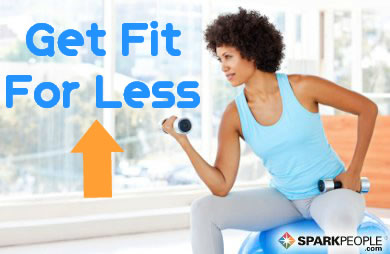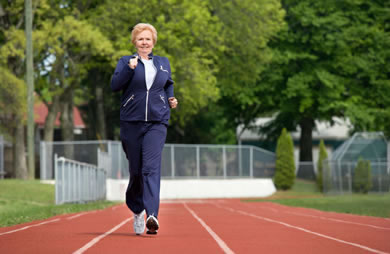|
In today's highly visual age, it's hard to turn a magazine page or watch a TV show without getting bombarded by the myriad of things that you must change about your body in order for it to be acceptable. Rather than embarking on unhealthy diets or extreme workouts to "fix" your self-perceived flaws, look for opportunities to appreciate—dare we say, love—your body. That doesn't mean that you should jump off the wagon, stop exercising and start eating whatever you want. A healthy, calorie-moderated diet and regular physical activity are essential for physical and mental health. But you can still practice self-acceptance while continuing to work toward your goals. We talked to a few personal trainers to get their tips for self-affirmation. Practice complimenting your own body.In Carol Frazey's Fit School, her #1 client rule is that for every negative comment they say about themselves, they must say three positive ones—in front of the entire group. "It's amazing how many times per day we say things out loud about ourselves that we would never say about anyone else," Frazey says. "In many cases, we don’t even know we're doing this until it's called to our attention." Fitness trainer Lisa Reed uses a similar rule in her fitness studio. "It takes practice, as most people tend to harp on the negatives and aren't used to embracing what is good," she says. Some examples of positive comments among her clients include: "I have a strong and tapered back that gives me great posture in my sundress," or "My calves are great for high heels," or "I have strong shoulders from all the swimming I have done." Learn to accept (and welcome) change.Even with the best of intentions and a smart diet and exercise plan, the body will eventually start to show the effects of time, age, slowing metabolism and, for some women, pregnancy and childbirth. It's easy to fall into the trap of comparing your current self to a younger, slimmer or more toned version, but fitness professional Angelique Millis says that's a mistake. "Comparison and obsession can sabotage your body image and prevent you from loving the present you, the only you that exists," Millis says. "Time will continue to march on, and learning to self-love through each phase of your life is an art." Rather than striving to live up to what you used to be or what you could be, strive to embrace the now. SparkPeople coach Jen Mueller says that instead of bemoaning these changes, we should welcome them as badges of honor. A mother of four, she's maintained the same weight for years by eating healthy and staying fit, but has noticed changes in her body's shape and in how her clothes fit. "Accept that your body at age 40 is not going to be what it was at age 20," Mueller says. "Weight distributes a little differently, areas might not be as firm as they once were and the pounds might not melt off like they did years ago. Set goals and take pride in your accomplishments, but don’t beat yourself up if you can’t squeeze into the jeans you wore in high school." We all go through various stages of life, some more physically demanding than others. "The body has an incredible ability to adapt," says registered dietitian Cheryl Russo. "You have to believe that wherever you are in your journey, you're in the right place." Learn to accept the bad days.Inevitably, there will be days when you're feeling unmotivated, sluggish or discouraged. Millis points out that fitness comes and goes in seasons—there will be times when you're laser-focused on preparing for an event, such as a wedding, vacation or reunion, and will buckle down on your diet and workouts, but there will also be times when hectic schedules and stress zap your energy and motivation. "There will be days where you feel more toned and days when you feel bloated," Millis says. "Your body will fluctuate, sometimes up to 10 pounds of water weight (depending on the time of month for women)." Understand that the bad days don't define you, and they're temporary. Be kind and gentle to yourself. Before long, the motivation and confidence will return—and the valleys will give you a newfound appreciation of the peaks. Be generous with compliments to others.Look for opportunities throughout the day to deliver specific, sincere compliments. How will lavishing praise on someone else make you feel better about yourself? "Giving a compliment is an instant mood shifter—not just for them, but for you, too," Reed says. "It feels good to make someone else feel good." Be in the moment.In the perpetual race against the clock, it's easy to get bogged down by daily tasks and anxiety about what's coming next. "When you're living in the present instead of being stressed about the past or future, you truly appreciate what you have," Reed says. "The future will take care of itself." Make an effort to be more mindful of your surroundings. Instead of spending your walk worrying about a big work project, shift your focus to the beauty of nature, the smell of fresh flowers and the feel of your feet on the pavement. If you're grabbing a quick lunch during the workday, take the time to savor the flavors and textures of your food instead of rushing through each bite. If mindfulness doesn't come naturally to you, try meditation. "It will teach you to control all the self-talk and allow you to hear and feel every breath you take," says Reed. "Not only will you feel less stressed, but you'll also have a clearer vision for your life when you create space in your mind to live in the present." To combine exercise and relaxation, try walking meditation. Don't aspire to unrealistic (or impossible) expectations.Today's average model weighs 23 percent less than the average woman, yet we're bombarded by images of waif-skinny, airbrushed figures every day. According to the National Association of Anorexia Nervosa and Associated Disorders, nearly 70 percent of girls in fifth through 12th grade said that their body image ideals were influenced by pictures in magazines. Attempting to match these extreme examples isn't only bad for your psyche, but also for your health. And in the age of photo editing tools and filters that drastically alter images, much of what we see doesn't actually exist in real life. "Our perception of beauty as a society has become more and more skewed over the years," Millis says. "Smoothing out wrinkles, removing cellulite and concealing scars, freckles or age spots may create a 'flawless finish,' but it also robs women of their authenticity as they strive to fit this picture-perfect mold." Next time you're looking in the mirror and catch yourself comparing your reflection to what you've seen on Instagram, TV or in magazines, remind yourself that you are real and those images are not. Remember that the flaws your mind is magnifying are unlikely to even be noticed by others. Stop obsessing over the scale.Although it's tempting to weigh yourself every day when you're trying to reach a specific goal, too much pound-checking can cause you to become discouraged and derail your efforts. If you're getting too hung up on the numbers, try using other ways to measure progress aside from the scale. Alissa Rumsey, a NYC-based registered dietitian and spokesperson for the Academy of Nutrition and Dietetics, says that there's been a switch in recent years from a focus on weight to a focus on health. "You can build healthy eating and fitness habits without focusing directly on weight," Rumsey says. "We need to learn to celebrate body diversity. Just because you're skinny doesn't mean you're healthy, and just because you're overweight doesn't necessarily mean you're unhealthy. Having a healthy body image helps improve your mental and emotional health, which can be just as important as physical health." According to Rumsey, as long as you have healthy eating habits, are regularly physically active and have normal cholesterol, blood pressure and blood sugar levels, your weight is likely right where it should be. Russo agrees that from a health perspective, a person can be very skinny but have a higher percentage of body fat, with no muscle tone—a phenomenon known as "skinny fat." "Carrying a higher percentage of body fat compared to lean muscle offers a higher risk of ailments," Russo warns. "This person may look good according to media benchmarks, but in reality is not healthy." As Mueller points out, reaching a magic number on the scale isn’t likely to make you suddenly feel great about yourself. "There are so many other wonderful things about you that aren’t defined by how much you weigh or what size you wear," she says. "Focus on the good things about you and how you can make yourself happy today, in this moment, regardless of what the scale says." Appreciate what your body can do.Your body may not look exactly like the one in your mind or on the front of your fridge, but that doesn't mean it isn't serving you well. Cultivate gratitude for all the things you can do physically that many people cannot, whether it's running a 10K or simply walking for 10 minutes. "People should be more concerned with what their insides are looking like, rather than their outsides," says Russo. "Can you walk up a flight of stairs without huffing and puffing, or keep up with your kids? Can you carry groceries into your home?" Mastering the basic functions you need to accomplish daily tasks and enjoy the activities you love should trump aesthetic goals. Shop for your current body.Have you been hanging onto a pair of jeans from years ago, with plans to lose weight and fit in them again? When shopping for clothes, do you buy them in your goal size instead of your current size? Or maybe you've shed some pounds, but are waiting to replace baggy clothes until you've hit your target weight. Although you might think you're motivating yourself by "shopping skinny," you could actually be tricking your mind into viewing your current size and shape as not worthy enough. "If you're unhappy about those extra pounds that you haven't been able to lose, you're in luck—there are so many clothing options that flatter every type of figure," Russo says. "Just do a search for your body type." Whether you're a size four or a size 24, investing in some pieces that fit just right will help you recognize the beauty of your body today. Save some love for yourself.How often do you tell your spouse, children or other friends and family members that you love them? Now compare that to how often you say it to yourself. Frazey says the first step toward accepting your body is to give yourself the same love and attention as you do the other important people in your life. She recommends taking five seconds each day to look in the mirror at your reflection and say out loud, "I love you." You might feel silly at first, but that simple act has the power to transform your feelings of self-worth. On days when you feel down on yourself, Millis recommends looking in the mirror and repeating affirmations to yourself, such as "I am beautiful the way that I am, right now in this very moment," or "I have always been and will always be beautiful, no matter my size, weight or circumstance." |
More From SparkPeople
|



















.png)

